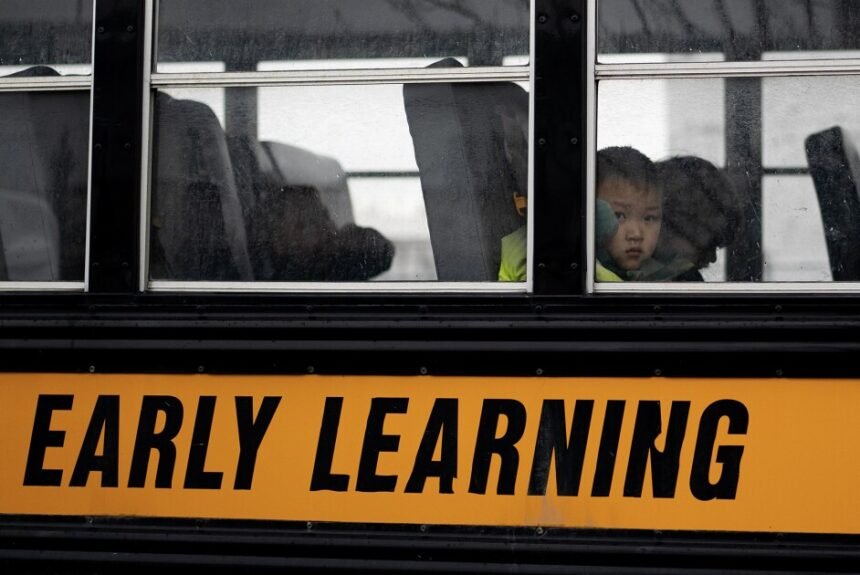Head Start providers nationwide are experiencing intermittent funding delays, administrative challenges, and existential fears in the wake of federal staffing reductions and policy changes that have upended the program for much of its 60th anniversary year.
Programs under the Head Start banner in every state collectively provide child care, early education, meals, and more to roughly 833,000 children ages 0 to 5.
Since January, the Trump administration has delayed and disrupted routine funding disbursements; imposed new requirements and review processes for program administrators to claim their allocated funding; laid off dozens of federal workers who help programs follow regulations; and announced a plan to block undocumented immigrants from enrolling.
Now, even banal dispatches and routine announcements from the federal government set off waves of fear and confusion among Head Start providers and the families they serve, said Jennie Mauer, executive director of the Wisconsin Head Start Association.
“Everything feels anxiety-producing in this environment because there’s such little communication right now,” Mauer said. “It feels incredibly stressful.”
Federal government sends mixed signals on Head Start funding
During a July 22 confirmation hearing before the Senate finance committee, Trump’s nominee for assistant secretary for family support at the Department of Health and Human Services said he appreciates the role that Head Start plays in reducing cost burdens for child welfare programs.
Nominee Alex Adams also said he wants the program to have “more parental engagement” and a bigger focus on nutrition and “a healthy lifestyle.”
But those generally positive sentiments noticeably contrast with other Trump administration actions.
The Government Accountability Office, an independent federal watchdog, found on July 23 that the Trump administration broke federal law when it withheld funding from some Head Start providers between January and April. The GAO decision is one of five so far in which the watchdog says it was illegal for the second Trump administration to disrupt federal funding.
“The burden to justify withholdings rests with the executive branch,” wrote Edda Emanuel Perez, the GAO’s general counsel. “If the administration wishes to make changes to the appropriation provided for Head Start, it must propose legislation for consideration by Congress.”
More recently, Head Start programs in several states—including California, Louisiana, New York, and Texas—have had to issue mass layoff notices or temporarily shut down as their expected supply of annual federal funding arrived, without explanation or advance notice, months behind schedule.
In Boise, Idaho, one program struggled for three weeks to secure a routine funding drawdown—only getting what it needed when a U.S. senator stepped in to help, said Meg Woller, executive director of the Idaho Head Start Association. The program at one point mulled taking out a loan, she said.
For several months earlier this year, providers nationwide also worried the program might soon cease to exist, thanks to a leaked White House document that appeared to show the Trump administration asking Congress to nix federal investment in Head Start altogether.
But the administration’s eventual budget proposal maintained level year-over-year funding for Head Start. The Senate appropriations committee last month approved a modest increase over 2024 levels.
The full Senate still has to vote on the federal budget, and the House hasn’t yet advanced its own funding bill for the fiscal year that starts Oct. 1.
Trump’s DEI crackdown leaves programs confused and stressed
Funding issues haven’t been the only new headache for Head Start operators this year. In March, the Trump administration announced that it would revoke any funding Head Start providers planned to spend on “diversity, equity, and inclusion (DEI) initiatives,” without specifying what would and wouldn’t be considered objectionable.
Since then, providers have had to wait longer than usual for the Trump administration to review—and sometimes question—routine expenses submitted for reimbursement.
Four state Head Start advocacy organizations—representing Illinois, Pennsylvania, Washington, and Wisconsin—and two parent groups in April sued the Trump administration over the DEI crackdowns.
In federal court in Washington state last Tuesday, the plaintiffs’ attorney, Jennesa Calvo-Friedman, testified that a Head Start provider heard from a federal agency staffer that it needed to remove references to Americans with Disabilities Act training in order to qualify for continued funding. Head Start programs are required by law to provide such training, and to ensure that at least 10 percent of their enrolled students have disabilities.
A board member for another Head Start program had to remove the term “inclusion” from their job title to avoid raising the federal agency’s suspicions, even though it was for the board member’s unrelated day job, said Calvo-Friedman, a senior staff attorney for the American Civil Liberties Union.
A lawyer for the Trump administration defended the anti-DEI policy as simply reinforcing federal civil rights laws that providers were already required to follow.
“DEI is just a subset of those already-protected qualities that are already under Title VI. They cannot discriminate based on them already,” the Trump administration lawyer said during the Aug. 5 hearing. “So it’s just a more narrow set that the government is emphasizing—’Hey, this is our priority.’”
But Judge Ricardo S. Martinez, who was appointed to the court by President George W. Bush, appeared skeptical.

“If you’re telling someone they can’t do something, they need to understand what it is they can’t do,” Martinez said. “Maybe I’m being a little too simple here, but it’s like indicating you can’t speed, and when people say, ‘How fast can I go on any particular stretch of road?’ they go, ‘Well, you can’t go too fast.’”
Another hearing in that case is scheduled for Sept. 9.
Funding issues appear poised to arise intermittently in the meantime. A report published July 31 by the office of Sen. Richard Blumenthal, D-Conn., estimated that new Head Start review processes prompted an additional 20,000 hours of work for remaining HHS staffers to process funding requests and other inquiries from Head Start providers.
Federal staffers who work on Head Start received training in May on the new process, the report says. “However, the training described a system that was inherently more cumbersome and prone to delays than the process it replaced.”
Regional office closures leave some programs in the dark
Navigating all this chaos has been more difficult for Head Start providers than it would have been before major federal staffing cuts, program advocates say.
The federal office of Head Start used to operate 10 regional offices, each of which was assigned to assist providers in a handful of states. On April 1, the Trump administration abruptly closed five of those offices, effectively terminating dozens of employees and leaving them without guidance on how to turn in government-issued devices and handle sensitive records they had been overseeing.
Many providers who depend on these staffers found out about the layoffs from news reports. For more than three months, Head Start providers in the 22 states whose assigned regional offices closed had no clear point of contact for questions about how to comply with federal regulations, or whether their federal funds would arrive on time.
Those federal staffers help ensure Head Start funding applications are complete and on schedule, and that Head Start providers get waivers from federal requirements when federal policies, like requirements for participation from parent volunteers, don’t make sense for their local communities.
They also help explain new policy changes like the ones the Trump administration has abruptly announced this year.
“In the old days, we would reach out to program specialists for guidance on, ‘What does this mean for my particular program?’” said Michelle Haimowitz, executive director of the Massachusetts Head Start Association.
The federal government has started moving to close communication gaps. In the last few weeks, Head Start providers in states previously served by now-closed regional offices have been paired with federal workers in the closest remaining regional offices.
But some providers remain concerned they won’t get the assistance needed.
“A program specialist that has twice as many programs and doesn’t know our specific communities are going to have a much harder time approving those kinds of requests,” Haimowitz said.
New restrictions on undocumented immigrants spark broad fears of enrollment loss
The latest wrinkle for Head Start has been the July 10 announcement that the federal government plans to reclassify Head Start as a “federal public benefit” that undocumented immigrants would be barred from accessing. The Trump administration has since agreed to delay enforcement of the new policy until Sept. 11 in 20 states and the District of Columbia, which sued to overturn it, plus Pennsylvania.
Head Start providers previously didn’t collect details on students’ or families’ immigration status, which means there’s no way to know how many students programs would lose if the new policy moves forward. Democratic state attorneys general, in a federal lawsuit filed July 21, argued that the administrative burden of implementing the new policy could force some programs to shut down.
Even in states where the policy is on hold, some providers are already reporting enrollment drops they believe stem from the Trump administration’s heightened enforcement and rhetoric against immigration. In Los Angeles County, where the Trump administration has executed high-profile immigration raids and even deployed the National Guard to clash with protesters, Head Start enrollment for the upcoming school year is down 20%, and attendance this summer was down 10%, local officials told LAist.
The policy is currently in effect in most states, but most observers believe it only applies to Head Start programs run by public school districts, colleges and universities, and for-profit companies. Programs run by private nonprofits and community health centers appear to be exempt, because federal law restricts nonprofits from being obligated to verify individuals’ immigration status.
In Idaho, where the policy is currently in effect, one Head Start provider is operated by a school district, two are operated by community colleges, and the remaining 10 are operated by entities that likely wouldn’t be subject to the public benefit changes, said Woller, from the state Head Start association.
Regardless of a particular program’s structure or affiliation, though, residents “are going to be scared of Head Start just in general regardless,” Woller said.
One provider told Woller, “they may not be able to do the job anymore if the rule changes comes to fruition because it would go against their personal morals and ethics.”
The public benefit policy puts up roadblocks that could keep American citizens from enrolling as well, said Haimowitz from Massachusetts.
Parents experiencing homelessness or domestic abuse might lack access to the paperwork the Trump administration wants Head Start providers to examine during the enrollment process.
Head Start programs are required to maintain full enrollment relative to the funding they receive. If policies requiring more strict paperwork reviews contribute to a drop in the number of students, some programs might end up with fewer dollars to pay staff and purchase materials.

“The other real impact is Head Start has to be a safe and welcoming place to families for us to be able to properly serve them and provide the types of comprehensive benefits that we are required by federal law to do,” Haimowitz said. “This notice again seeks to paint our programs as less safe and less welcoming than we have ever been.”
Martinez, the judge in the case concerning anti-DEI and regional office layoffs, is also weighing whether to halt the policy nationwide, he said during the Aug. 5 hearing.
States may struggle to pick up the slack
President Donald Trump and other administration officials have emphasized their preference for shifting federal funding responsibilities for education and other priorities to the states.
Pennsylvania is already gearing up for that possibility—on July 7 the state House approved a bill that allows regional education offices to qualify for state pre-K grants even if they don’t operate federally funded Head Start programs, as is currently a condition of receiving the state grants.
But other states have been more reluctant to invest. In Alaska, Republican Gov. Mike Dunleavy overrode the legislature’s efforts to increase funding for early childhood education centers and interventions for infants and toddlers with disabilities. In Oregon, legislative budget analysts say the state’s current investment of $1.4 billion falls $45 million short of ensuring that existing early childhood programs can continue operating, let alone grow to meet surging demand.
The funding issues have prompted some providers to look for alternative funding sources. The Duluth school system in Minnesota pre-emptively secured additional state funding to fill the gap that might open if federal funding for its Head Start program took a sudden nosedive.
One Head Start provider in Wisconsin is looking into converting its program to an independent charter school, or a private program for which parents can use state-funded vouchers.
“I want to find ways in which we can have the most diverse sources of funding possible so that we are not in this position,” Bill Walsh, chief operating officer of the nonprofit Head Start provider in Waukesha, Wis., told the Milwaukee Journal Sentinel.







